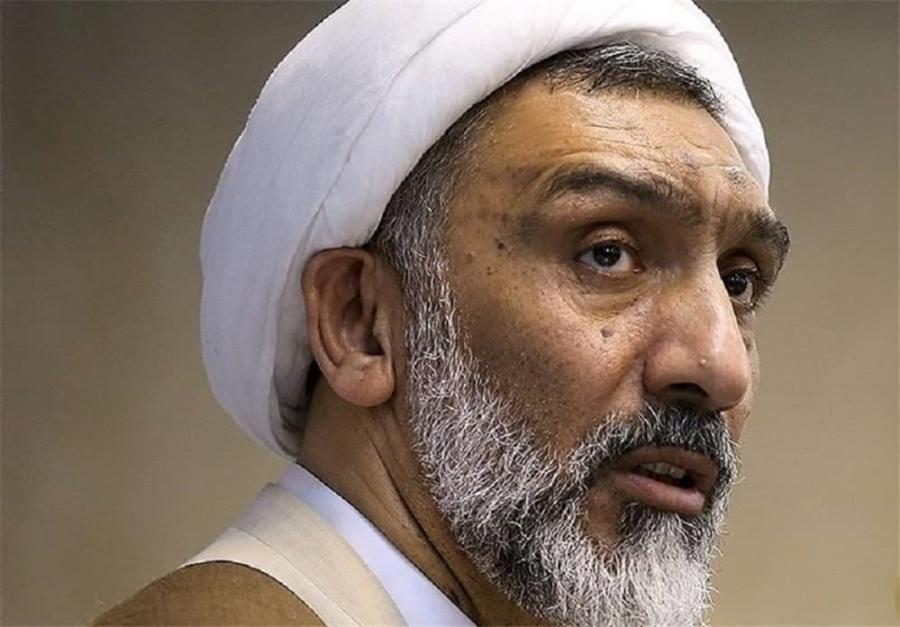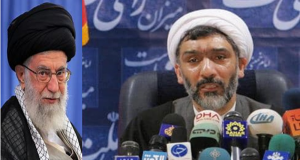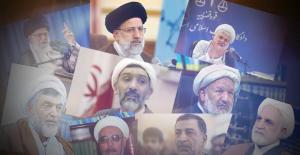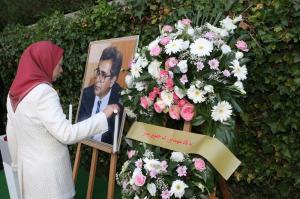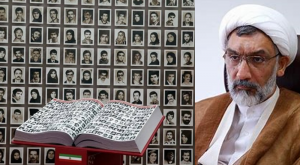
(Video) Iran: Mostafa Pourmohammadi’s Controversial Presidential Candidacy
In 1980, Pourmohammadi, then a young prosecutor, was sent to Khuzestan province, where he issued death sentences to over 300 prisoners, including teenagers.
PARIS, FRANCE, June 12, 2024 /EINPresswire.com/ -- The National Council of Resistance of Iran-(NCRI) Foreign Affairs Committee in an article stated that Mostafa Pourmohammadi, a significant figure in Iran’s political landscape, has announced his candidacy for the upcoming presidential elections despite his controversial past.
Pourmohammadi is infamously known as one of the principal perpetrators of the 1988 massacre of political prisoners in Iran.
Previously disqualified from the Assembly of Experts election in February 2023, Pourmohammadi has now set his sights on the presidency.
His close association with the regime’s demised president Ebrahim Raisi and his status as a confidant of the Supreme Leader underscore his influence within the regime.
Pourmohammadi’s involvement in the 1988 massacre, during which more than 30,000 political prisoners were executed, marks a dark chapter in his career.
As an advisor to the head of the judiciary and the general secretary of the Combatant Clergy Association, Pourmohammadi has long been a powerful figure within Iran’s political and judicial systems.
In the winter of 1980, Pourmohammadi, then a young prosecutor, was sent to Khuzestan province, where he issued death sentences to over 300 prisoners, including teenagers.
By 1987, he joined the Ministry of Intelligence under Mohammad Rayshahri and later served as Deputy Minister of Foreign Affairs and Deputy Minister of Intelligence during Ali Fallahian’s presidency. During this period, he also became a member of the notorious death committee responsible for the 1988 executions.
Pourmohammadi’s role extended beyond Iran’s borders as he oversaw the assassination of numerous regime opponents abroad, including Dr. Abdulrahman Qasemlou, Dr. Kazem Rajavi, Fereydoun Farrokhzad, and Sadegh Sharafkandi. These assassinations were part of a list of 100 individuals whose elimination was sanctioned by the Iran regime’s Supreme National Security Council.
A revealing moment came in July 2016 when Ayatollah Montazeri’s son released an audio tape in which Pourmohammadi and other death committee members sought Montazeri’s approval for executing the remaining political prisoners. Montazeri’s response condemned them, stating that history would remember them as criminals.
In August 1988, the regime’s founder, Ruhollah Khomeini, ordered a panel, known as the Death Committee, to re-examine the cases of political prisoners. Khomeini’s directive emphasized dealing with prisoners “with revolutionary anger and hatred” and executing those deemed to be “in the position of hypocrisy.” Pourmohammadi, representing the Ministry of Intelligence, played a central role in these brutal executions.
Pourmohammadi’s interrogation of prisoners often determined their fate based on their political or religious beliefs. Ayatollah Montazeri opposed these executions, particularly pointing out that Pourmohammadi cited Khomeini’s fatwa to justify the execution of female prisoners, specifically members and supporters of the People’s Mojahedin Organization of Iran (PMOI/MEK).
In a television interview, Pourmohammadi defended his actions during the 1988 massacre, referring to it as a “religious duty.” He condemned the release of the audio file of Montazeri’s meeting with the death committee as “treason.”
Throughout his career, Pourmohammadi has held numerous significant positions within Iran’s judicial and security apparatus, including:
• Prosecutor of the Revolutionary Courts in Khuzestan, Hormozgan, and Khorasan provinces (1979-1986)
• Military prosecutor of the revolutionary courts in western Iran (1986-1987)
• Advisor to the Minister of Intelligence (1987-1990)
• Deputy Minister of Intelligence (1990-1991)
• Head of Foreign Affairs of the Ministry of Intelligence (1990-1999)
• Lecturer of Political Science at Imam Sadiq University (2000-2005)
• Head of Political and Social Affairs for the Supreme Leader (2002-present)
• Head of the National Inspection Organization (2005-2008)
• Minister of Justice (2013-2017)
• Advisor to the head of the Judiciary (2017-present)
• Minister of Interior (2005-2008)
Pour Mohammadi’s presidential candidacy reignites debates over his controversial past and the ongoing influence of hardliners in Iran’s political landscape.
Now the death of former Iranian President Ebrahim Raisi is a significant blow to the rule of Velayat al-Faqih, shaking the very foundations of the regime. Following the recent uprisings, particularly the severe unrest in 2022, the regime’s Supreme Leader Ali Khamenei sought to sustain his regime by purging the government and establishing a youthful, Hezbollahi-led administration.
To achieve this, Khamenei relied on the most loyal individuals within the regime, those who would unquestioningly execute his directives. Raisi was one such loyalist, notorious for his direct involvement in the massacre of thousands of political prisoners in the summer of 1988. This role earned him the grim nickname “The Butcher of Tehran.” Khamenei had heavily invested in Raisi, even considering him as a potential successor for the position of Supreme Leader.
Mostafa Pourmohammadi’s dark past and present
Pourmohammadi was born in Qom in 1959. He attended the seminary from an early age. Before Iran’s 1979 revolution, he studied at Haqqani school in Qom, where most of the regime’s top officials and clerics studied.
Months after the 1979 revolution, Pourmohammadi was dispatched to Khuzestan, southwest Iran, as the province’s “Prosecutor of the Revolutionary Court.” According to eyewitnesses, Mostafa Pourmohammadi sentenced more than 300 prisoners to death in Bandar Abbas Prison, including 16- and 17-year-olds. Pourmohammadi was only 20 years of age at that time.
From the inception of the Ministry of Intelligence (MOIS) in 1983, Mostafa Pourmohammadi was the deputy to Mohammad Mohammadi Reyshahri, the first Minister of Intelligence.
He also held the positions of deputy and head of the Foreign Intelligence Division under the leadership of Ali Fallahian and Ghorbanali Dorri-Najafabadi in the 1990s. Under former regime president Mohammad Khatami, Supreme Leader Ali Khamenei appointed Mostafa Pourmohammadi as one of the officials in the Special Office of Intelligence and Security of the Supreme Leader.
While acting as the prosecutor of the revolutionary courts in several provinces, Pourmohammadi ordered, oversaw, and participated in the systematic purge of dissidents.
In September 1981, Mostafa Pourmohammadi was transferred from Bandar Abbas to Mashhad and became the Attorney General of Khorasan Province.
In the first week of January 1981, several young women were executed in Vakilabad prison in Mashhad. Immediately after the executions, some of the families of the executed girls told their relatives that their daughters had been raped before the executions.
Based on the evidence obtained from some relatives, three executed girls, Sima Motalebi, Mandana, and Mitra Mojavarian, were tried and sentenced to death in a few minutes without a lawyer.
A few days after the news of the execution of Mandana and Mitra Mojavarian was announced, a prison guard went to their houses and gave flowers and sweets, saying that the Revolutionary Guards had married their daughters before the execution.
Sima also wrote on her leg that “I was raped.”
According to the testimony of two political prisoners, one of whom was tried in September 1981 and the other in January 1981, from September to the end of January, Ali Razini was the Sharia judge. He issued all execution orders for young women. Mostafa Pourmohammadi, as the Revolutionary Prosecutor of the province, supervised all these executions. Pourmohammadi’s human rights abuses reached their peak in the summer of 1988.
Pourmohammadi and the 1988 massacre.
Pourmohammadi played a key role during the 1988 massacre of Iranian political prisoners. Over 30,000 political prisoners were executed in a matter of months. Most of the victims were members and supporters of the People’s Mojahedin Organization of Iran (PMOI/MEK).
Hossain-Ali Montazeri, then-successor of Ruhollah Khomeini, revealed that Pourmohammadi was “the representative of the MOIS in charge of questioning prisoners in Evin Prison” during the 1988 massacre. Montazeri described Pourmohammadi as one of the “central figures” in the massacre.
Montazeri stated that whenever a decree prohibiting the execution of girls was issued, Pourmohammad would counter by citing Khomeini’s fatwa regarding the Mojahedin.
Ruhollah Khomeini issued a fatwa in 1988, ordering regime authorities to execute dissidents, particularly supporters and members of the MEK. On August 28, 2016, Pourmohammadi was quoted by the state-run Tasnim news agency, stating, “God commanded to show no mercy to the nonbelievers because they will not show mercy to you either.
There should be no mercy to the [MEK] because if they could, they would spill your blood, which they did. We are proud to have carried out God’s commandment regarding the [MEK] and to have stood with strength and fought against the enemies of God and the people.”
Pourmohammadi in the MOIS
Mostafa Pourmohammadi joined the Ministry of Intelligence and Security (MOIS) in 1987 under then-intelligence minister Mohammad Rieshahri. At the age of 29, under the direction of Ali Fallahian, he was appointed director of the ministry’s counterintelligence directorate. From 1997 to 1998, Pourmohammadi served as the director of the ministry’s foreign directorate.
During this period, he oversaw the assassinations of numerous dissidents, including Dr. Abdolrahman Ghassemlou, Secretary-General of the Kurdistan Democratic Party of Iran (KDPI); Dr. Kazem Rajavi, the NCRI Representative in Switzerland; Fereydoun Farrokhzad, a prominent Iranian showman; and Sadegh Sharafkandi, Ghassemlou’s successor in the KDPI.
In 1998, at least 120 prominent Iranian political commentators, writers, and intellectuals were assassinated inside Iran. Dariush and Parvaneh Forouhar, prominent political activists and leaders of the Nation of Iran Party, as well as Majid Sharif, Mohammad Mokhtari, and Mohammad Jafar Pooyandeh, well-known dissident writers and journalists, were murdered by the MOIS. As one of the MOIS’s top officials, Pourmohammadi was involved in these killings, which became known as “the Chain Murders.”
Pourmohammadi garnered significant notoriety and disapproval. In 1999, when he expressed intentions to run for parliament from Qom, even state officials protested against his candidacy, ultimately leading him to withdraw.
In June 2000, Pourmohammadi commented on the closure of newspapers, expressing that while shutting down newspapers was not an ideal approach, he questioned if there were any viable alternatives.
On September 18, 2000, Mohammad Khatami referred to the MOIS “therapeutic killing” project and mentioned that Akbar Ganji, one of the individuals who uncovered the “darkroom of ghosts,” was being tried for exposing the roles of former Intelligence Minister Ali Fallahian and his deputies Saeed Emami and Mostafa Pourmohammadi, as well as those issuing fatwas for the murders, such as Mohseni Ejei.
Pourmohammadi was one of the main plaintiffs against Emadeddin Baghi, one of the founders of the IRGC a former member of the editorial board of the now-banned newspaper Fath, who was sentenced to five and a half years in prison.
Pourmohammadi explained his complaint against Emadeddin Baghi, stating, “Regarding the chain murders, which were extensively discussed in newspapers, my name and those of some colleagues were mentioned in articles. However, the situation escalated when the defendant, Baghi, explicitly named me in a specific instance.
In an article titled ‘Decoding the Black Box of Chain Murders’ published on January 30, 2000, in Fath newspaper, Baghi mentioned the murder of Mrs. Fakhr ul-Sadat Burqai, who happened to be my cousin’s wife, claiming it was among the chain murders and that I was involved.
Baghi alleged that the late Borghei possessed certain information, leading to her murder. According to him, her father was advised not to pursue the case due to the powerful opposition, and the forensic doctor delayed issuing a report. If Baghi asserts that this murder was political and part of the chain of murders, he should provide evidence and documentation. It’s as if our professional duty was merely to kill a chaste, virtuous, and knowledgeable woman.
Baghi’s article appears to aim at disturbing public opinion.”
Mostafa Pourmohammadi played a key role within the primary team responsible for initiating judicial proceedings against government critics and dissidents. This team’s mandate included the apprehension and interrogation of detainees.
In his capacity as Deputy Minister of Intelligence, Pourmohammadi was involved in a manipulated report titled “New Information on the Chain Murders,” which essentially absolved all the defendants of guilt.
The report shifted the blame onto a single individual, Mostafa Kazemi Mousavi, portraying him as the primary perpetrator. Pourmohammadi’s report went further to suggest that Mousavi enjoyed the trust of former President Mohammad Khatami, thereby exonerating other prominent figures, such as Saeed Emami while implicating a rival faction. In an interview in 2019, Pourmohammadi reiterated these statements once more.
Despite widespread accusations regarding Pourmohammadi’s alleged involvement in serial murders and massacres, rumors circulated suggesting that Khamenei had sidelined him from his office. However, it became evident in 2003 that Pourmohammadi remained actively engaged in “his official duties.”
Due to his significant notoriety within the Iranian regime, Pourmohammadi has consistently been a subject of concern for state officials, leading to a cautious and often contradictory approach to dealing with him. In 2015, he ran for the Assembly of Experts from Alborz Province but his qualification was not approved by the Guardian Council.
During the March 1 elections for the Assembly of Experts, Pourmohammadi nominated himself, only to have his eligibility rejected by the Guardian Council. He lodged a complaint, and after three days, his complaint was positively addressed, and his eligibility was confirmed by the Guardian Council.
If you wish to receive the NCRI weekly Newsletter, please use the following link to subscribe: https://bit.ly/3SMgEla.
Shahin Gobadi
NCRI
+33 6 61 65 32 31
email us here
Pourmohammadi's close association with the regime’s demised Ebrahim Raisi and his status as a confidant of Khamenei shows his influence within the regime.
EIN Presswire does not exercise editorial control over third-party content provided, uploaded, published, or distributed by users of EIN Presswire. We are a distributor, not a publisher, of 3rd party content. Such content may contain the views, opinions, statements, offers, and other material of the respective users, suppliers, participants, or authors.

